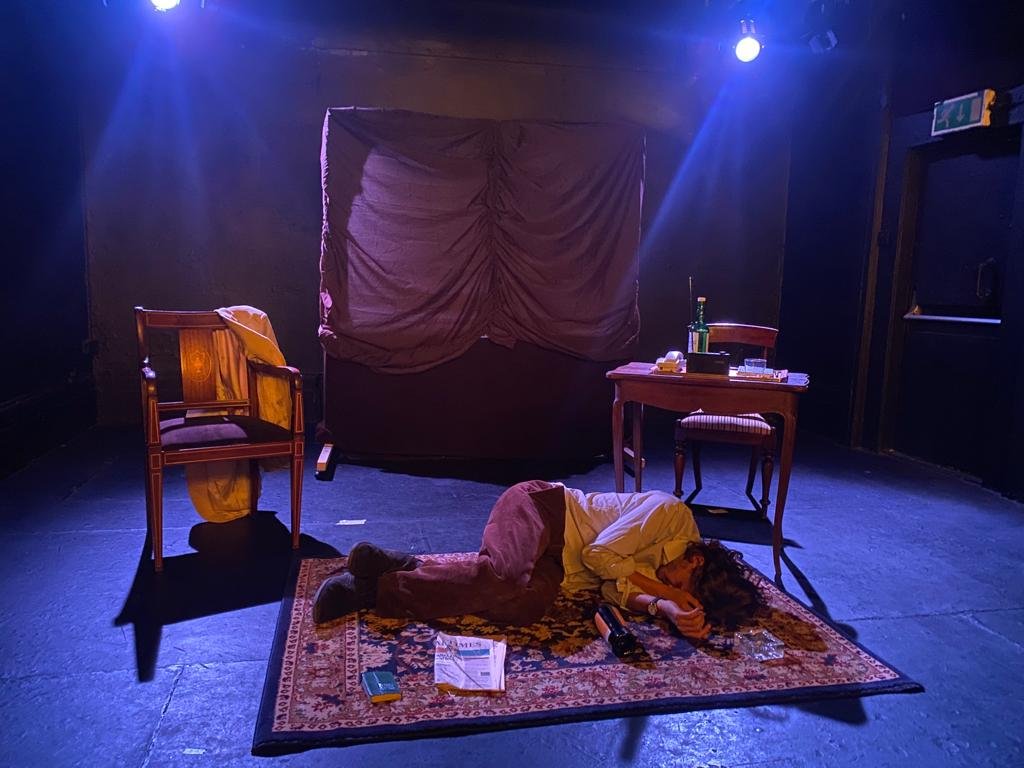‘OUT TO LUNCH’ : A Review
In the opening monologue of Out To Lunch – a new ‘comedy play with songs’ by Hughie Shepherd-Cross and Nathan Brown, heading to the Edinburgh Fringe next month – the jaded restaurant critic Marcus Tuckwell observes with displeasure that the phrase forming the play’s title is also a euphemism for going insane. Tuckwell reckons the idiom does a disservice to those, like him, for whom going out to lunch – and staying there – is just about the only reason to get up in the morning. The play, however, is less worried about potential aspersions on sanity than its antihero: Out To Lunch is a comedy as dark, delicious, and probably unethical as any quenelle of caviar plated in London’s swishest eatery.
We’re introduced to Tuckwell at the start of the play, as he scrapes himself off the stage floor – he’s one of those characters who seems perpetually hungover, even when drunk – to deliver a bombastic and slightly unhinged defence of (what he considers to be) the venerable tradition of extravagant lunching. But Tuckwell’s somewhat manic grandeur soon turns out to belong to the ‘delusions of’ variety. At the recent Food Writers’ Awards, a cruel joke made it clear that his peers in the industry consider him as washed-up as the dishes. Resolving to make a comeback, Tuckwell sets his sights on the mysterious ‘Loiseau Award’. This occult prize is named after the real-life chef Bernard Loiseau, whose biography might suggest the pitch-black well from which Shepherd-Cross and Brown draw their gags. The cast is rounded out by Emily Cairns as Angie, Tuckwell’s caustic and (one presumes) long-suffering agent/drinking partner, and Sam Scruton as Jezzer, an emotionally fragile chef of dubious talent and somewhat flimsy scruples. (There’s also a brilliant silhouette scene in which the actors double as real food writers – I’ll never read one of Jay Rayner’s reviews the same way again.)
Shepherd-Cross’ script is fast-paced and foul-mouthed, and a real comic talent is evinced above all in the play’s dense verbal texture, packed with startling metaphors and hilarious tirades. Tuckwell is the play’s centre: connected by more than their similar names to Malcolm Tucker, he shares with Armando Iannucci’s creation an indefatigable capacity for invective, while a generally soused misanthropy recalls Dylan Moran as Black Books’ Bernard Black. Yet Tuckwell is also a unique presence, alternately magnetic and pitiful, and brought to life with extraordinary verve by Fabian Bevan. Bevan’s performance has the improvisatory quality of the most polished comedians, incorporating elements of stand-up and farce alongside impeccable set-piece readings. Yet because the play is about, and animated by, Tuckwell, the other characters occasionally feel less developed. Cairns’ Angie undergoes rather dramatic shifts of personality between scenes: her role as snarky foil to Tuckwell’s ravings means that her objectives seem calibrated more to the whims of the plot – and these are numerous – than to any wholly coherent sense of character. Similarly, Scruton’s Jezzer feels at times a bit thin, more a punchline or stock type – pun unintended – than a creation equal in depth to Tuckwell. Despite these compressions – no doubt necessitated by the one-hour runtime as much as any artistic shortcomings – the actors’ chemistry and commitment are hard to fault. Nathan Brown’s songs add a delightfully surreal veneer to the show, as well as affording even freer rein to the unlikely comparisons and caustic allusions which pepper (and salt) the play’s spoken scenes.
As Tuckwell observes at one point, the Michelin Guide awards stars based on the strength of their recommendation: two stars means ‘worth a detour’, while three denotes the restaurant’s deserving a ‘special visit’. If you find yourself in Edinburgh one lunchtime next month, alongside half a million theatre-hungry punters, make your way to Bristo Square: Out To Lunch isn’t to be missed.

